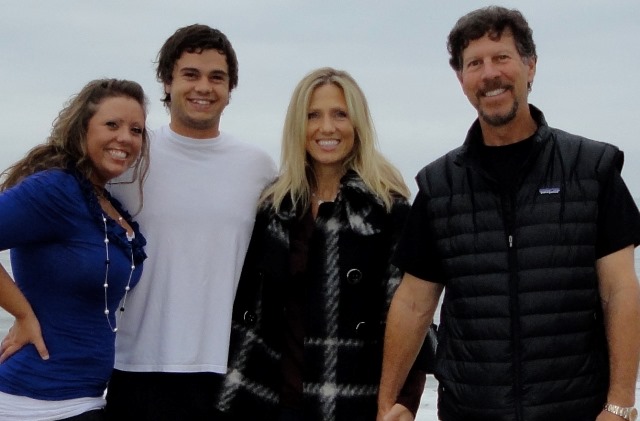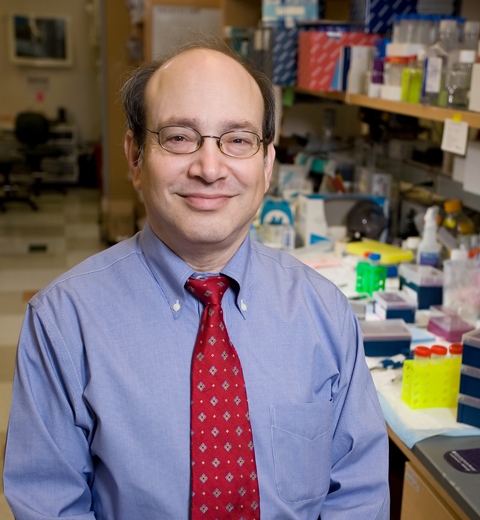Targeting Huntington's disease
Family affected by fatal illness supports UMMS study testing efficacy and safety of a “Trojan Horse” therapeutic
The deadly odds are 50-50: If a parent has Huntington’s disease (HD), then each of his or her children has a 50-50 chance of developing this fatal disease. For many years, Michael Berman’s family thought they had beaten the odds.

Jocelyn Topper, Michael’s life-partner, lost her father to Huntington’s. She had been tested after he was diagnosed and was told she did not carry the gene that causes the disease. Then in 2014, after a battery of more sophisticated tests following an automobile accident, she learned otherwise.
“It was as if a bomb went off in our family,” Michael Berman said. “We thought the chain had been broken. Now, there is a grandchild—all are at risk.”
Huntington’s disease is a fatal neurodegenerative disorder. A mutant copy of the Huntington gene causes a cascade of damaging effects that ultimately destroys nerve cells in the brain. As HD progresses, people lose muscle control and cognitive abilities. Today, some 30,000 people in the United States suffer from the disease—and an estimated 200,000 more carry the mutant gene and will eventually develop symptoms. There is no cure.
A retired CEO of a major investment bank, Berman understood how to approach complex issues and focus on reasonable solutions—and knew he would be drawing on these skills to address this sudden and vital new priority.
“Huntington’s became the focus of my life,” he said. “I wanted to learn everything I could about the disease, get the lay of the land for ongoing research, and see how we could make a contribution to finding a cure.”
Beginning with Jocelyn’s medical team in the couple’s home state of California, Berman reached out to HD experts across the country seeking information and guidance. That led him to Neil Aronin, MD, co-director of the Neurotherapeutics Institute at UMass Medical School.
“Michael called me, and I could hear the pain in his voice,” Dr. Aronin said. “I knew just 40 minutes on the phone wasn’t going to be enough to help him, so I agreed to meet with him and his family.”
Over the course of three days, Aronin, who is also a professor of medicine, cell & developmental biology, and microbiology and physiological systems at UMMS, delivered an intensive tutorial on human genetics and the disease. He explained how genes coded in DNA send messenger-RNAs to direct protein production in cells. People inherit two copies of most genes—one from each parent—and if one copy of the Huntington gene is mutated, it sends errant messenger-RNAs that cause the mutant Huntington protein, which is the hallmark of the disease.
 Aronin also explained that much remains unknown about how the mutant Huntington protein actually damages nerve cells. So the focus of the Aronin lab is to go “upstream” and target the defective gene itself to try to “knock down” production of the errant messenger-RNAs and toxic proteins, thereby preventing nerve cell damage.
Aronin also explained that much remains unknown about how the mutant Huntington protein actually damages nerve cells. So the focus of the Aronin lab is to go “upstream” and target the defective gene itself to try to “knock down” production of the errant messenger-RNAs and toxic proteins, thereby preventing nerve cell damage.
Berman subsequently traveled to Worcester to meet with Aronin and colleagues from the UMMS Neurotherapeutics Institute. Impressed with their work, Berman decided to support a significant new study at UMMS to test the efficacy and safety of a “Trojan Horse” therapeutic designed to infiltrate nerve cells in the brain and release an RNA-based construct that will reduce production of the Huntington protein.
“I spent a career making decisions based on a bunch of facts and on the quality of people involved. I believe I know a good thing when I see one. What’s happening with Neil and the team at UMass Medical School is extraordinarily exciting,” Berman said.
Back home, Berman said his family is adjusting to their new reality. Jocelyn is doing well and has no HD symptoms. Her children are getting counseling to grapple with the possibility of HD arising in the years to come. They all remain hopeful that supporting the HD research at UMMS will accelerate development of a cure, not just for their family, but for everyone affected by the disease.
“We are so grateful for Michael’s generous philanthropic contribution and the backing of his family,” Aronin said. “Private support like this is critical for the implementation of essential early-stage studies such as the Trojan Horse project. If it’s successful, then we can take the idea to the next level and present it to other private donors, foundations or the NIH (National Institutes of Health) for additional funding to support its development.”
Photos
Above: From right, Michael Berman with Jocelyn Topper and her children.
Below: Neil Aronin, MD


